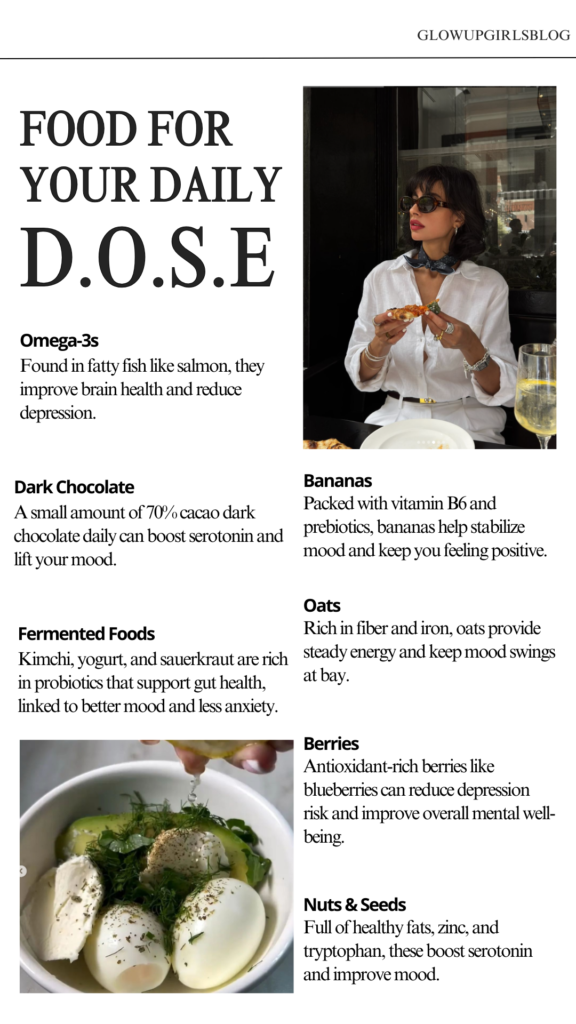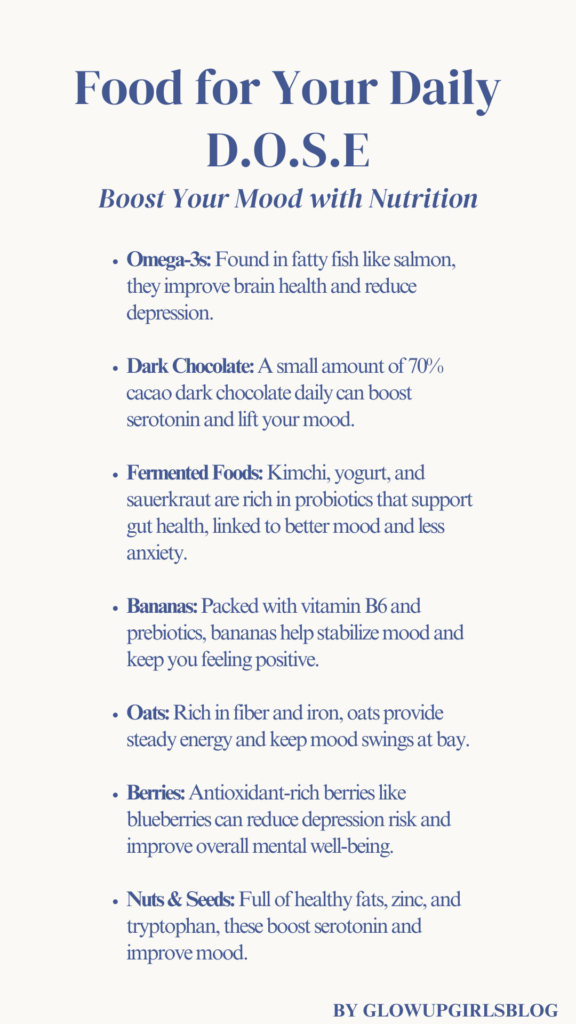Physical Address
304 North Cardinal St.
Dorchester Center, MA 02124
Physical Address
304 North Cardinal St.
Dorchester Center, MA 02124

Feeling down? You’re not alone. Studies show that 37% of people worldwide are unhappy. But, you can change your mood with simple daily habits. The “Daily D.O.S.E.” approach combines Diet, Outdoor time, Socialization, and Exercise for happiness.
We’ll look at how food, lifestyle, and activities can lift your mood. By adding these to your day, you can feel more fulfilled. Get ready to find joy in your daily “Daily D.O.S.E.” of happiness!
The link between what we eat and our mental health is deeper than we often realize. Some foods can greatly affect our brain and mood. By choosing the right foods, we can improve our mental health.
Many studies have shown how food affects our mental state. People who eat more nutritious foods often feel less sad and happier. A 2016 study found that eating more fruits and veggies made people feel more joyful and satisfied with life.
In 2017, a study with people who were depressed showed that a Mediterranean diet helped them feel better. This diet is rich in fruits, veggies, and healthy fats.
While we don’t fully understand the cause-and-effect of food on mental health, the evidence is clear. Certain foods and nutrients can greatly improve our mood and brain health.
Looking for natural ways to boost your mood? The ocean has the answer. Omega-3 fatty acids, especially DHA and EPA, help lower depression and improve brain health.
These fats make brain cell membranes more fluid. This helps brain cells talk better and send signals clearly. Eating fatty fish a few times a week can help your mood and brain health.
Fish oil supplements, like Nordic Naturals ProDHA, are a good alternative. They’re easy to take if you can’t eat fatty fish often. Research shows EPA-rich supplements can reduce depression symptoms.
It’s important to remember to take omega-3s in moderation. The US FDA says up to 3,000 mg per day is safe. The EU agrees, but only up to 5,000 mg.
Dark chocolate is a top pick for mood-boosting foods. It’s full of compounds that can make you feel better. The sugar in chocolate gives your brain a quick energy boost.
Other mood-boosters like caffeine and theobromine can also release serotonin. This makes you feel happy.
Dark chocolate is especially good because it’s full of flavonoids. These antioxidants improve blood flow to the brain. They also reduce inflammation and boost cognitive function.
This can help you feel more positive and in control of your mood. But remember, chocolate is high in calories. So, enjoy it in small amounts.
Experts say eating 1-1.4 ounces of dark chocolate with 70% cacao content daily is best. This amount can lower cortisol levels in stressed people.
So, when you’re feeling down or stressed, try a small piece of dark chocolate. It can brighten your day and add a bit of sweetness.
Fermented foods like kimchi, yogurt, kefir, and sauerkraut have been part of our diet for almost 10,000 years. They are packed with probiotics, which might help improve your gut health and mood. The fermentation process creates live bacteria, making these foods rich in probiotics.
Up to 90% of our serotonin, a mood regulator, is made in the gut. Research shows a link between a healthy gut and less depression. Eating fermented foods may help balance your gut microbiome, improving your mood.
There are over 5,000 types of fermented foods worldwide. They range from cereals and vegetables to legumes and dairy. Adding these probiotic-rich foods to your diet can nourish your gut and possibly boost your mental health.
Bananas might be the key to a better mood all day. They’re tasty and full of nutrients that help your mind stay happy.
Bananas are great for your mood because they’re rich in vitamin B6. This vitamin helps make serotonin and dopamine. These are the chemicals that control how we feel. So, bananas can make you feel happier and more relaxed.
Bananas also have fiber, which keeps your blood sugar steady. When blood sugar goes up and down, it can make you feel moody. So, eating bananas can help keep your mood calm.
Plus, bananas have prebiotics, which feed the good bacteria in your gut. A healthy gut is linked to better mood and less stress. Eating bananas helps your gut and your mind.
So, if you want to feel better, try a banana. They’re full of vitamin B6, fiber, and prebiotics. They’re a tasty way to keep your mood stable and positive.
Oats are a favorite whole grain that can boost your mood in the morning. They are packed with fiber, iron, and complex carbs. These nutrients provide a solid base for your mental and physical health.
The soluble fiber in oats, called beta-glucan, slows down carb digestion. This means your body gets sugar slowly, keeping your energy steady. This helps keep your mood stable and your focus sharp all day.
Oats are also a great source of iron. Iron is key for making hemoglobin, which carries oxygen to your brain and muscles. Without enough iron, you might feel tired, sluggish, or even have mood swings. Eating oats for breakfast can help meet your iron needs.
Starting your day with oats can prepare you for a happy, energetic, and productive day.
Berries are a true powerhouse for your mental well-being. They are full of antioxidants and phytochemicals. These help fight oxidative stress linked to depression and mood disorders.
The deep purple-blue berries are especially good. They have anthocyanins, which help lower depression risk.
Adding more berries to your diet is tasty and healthy. Blueberries, blackberries, and raspberries are among the top fruits for antioxidants. They are as good as pomegranates in this area.
Berries are not just good for your mood. They also have fiber, vitamins, minerals, and phytochemicals. You can easily add them to many diets, like paleo, Mediterranean, vegetarian, and vegan. So, why not enjoy the taste and benefits of berries for your mental health?
Looking for natural ways to improve your mood? Nuts and seeds are great options. They are full of nutrients that help with emotions and keep your mind sharp.
Nuts and seeds have lots of tryptophan, which turns into serotonin. Serotonin helps with mood, sleep, and hunger. They also have zinc and selenium, which are good for the brain and can lower depression.
Eating different nuts and seeds like almonds, walnuts, and pumpkin seeds can boost your mood. They have healthy fats, fiber, and antioxidants that are good for your brain.
Adding nuts and seeds to your MIND diet or Mediterranean-style eating plan can help your mood. It also supports your mental health.
Start your day with a cup of Coffee, the world’s favorite drink. It’s full of caffeine, which boosts your mood and alertness. Caffeine blocks adenosine, a fatiguing compound, making you more focused and alert.
Coffee does more than just wake you up. It also releases dopamine and norepinephrine, making you feel good. Studies show its phenolic compounds, like chlorogenic acid, might also improve your mood. But, we need more research on this.
Whether you wake up early or stay up late, Coffee can help. It gives you the energy to tackle your day with more alertness and positivity. Just remember to drink it in moderation to avoid jitters or anxiety.
Beans and lentils are packed with fiber and protein. They also have nutrients that boost your mood. These legumes are full of B vitamins, which help make neurotransmitters like serotonin and dopamine. They also have zinc, magnesium, and iron, which are good for your mood.
Canada is now the biggest producer of lentils. Lentils have more than 25% protein. One cup of cooked lentils has 230 calories, 39.9 grams of carbs, and 17.9 grams of protein. They also have lots of B vitamins and minerals like iron and zinc.
Beans like chickpeas and kidney beans are also great for your mood. One cup of cooked chickpeas has 269 calories and 14.5 grams of protein. They also have a lot of fiber and important nutrients like folate and iron.
To eat more beans and lentils, try replacing animal protein with them once a week. You can add them to soups, salads, and other dishes. Eating beans and lentils can help keep your mind and body healthy.
To unlock your mood’s full potential, you need a holistic approach. The “Daily D.O.S.E” strategy is a well-rounded plan. It boosts your mental well-being through diet, outdoor time, socialization, and exercise.
By focusing on four key areas – Diet, Outdoor Time, Socialization, and Exercise – you can improve your mood. Nutrition, nature, social connections, and physical activity work together. They help you feel happier and more fulfilled.
Embracing the Daily D.O.S.E approach can transform your life. It supports your mental health and helps you feel more positive, energized, and resilient.
Adding the “Daily D.O.S.E.” to your day can really help your mood. This includes eating well, spending time outside, staying connected, and exercising. Foods like fish and berries are full of nutrients that can make you feel better.
Also, being active and spending time with others can make a big difference. Together, these habits can make you feel your best. It’s all about making small changes to live a happier life.
By choosing to live a healthy lifestyle, you can feel happier and more fulfilled. Your mood is shaped by your choices. So, start using the Daily D.O.S.E. and work towards a happier, healthier you.


